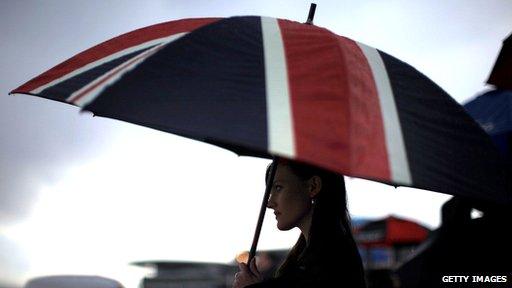Shorter .uk web address plan revived by Nominet
- Published

Nominet says the move will help .uk compete against hundreds of other new endings
UK websites will soon be able to use shorter addresses despite concerns the move could cause confusion.
The plan will allow owners to buy a "name.uk" web address to use instead of or in addition to "name.co.uk", "name.org.uk" and other alternatives.
Nominet, the organisation responsible, had previously shelved the idea after acknowledging it would confuse people.
But after making some changes and carrying out a second consultation it said it now planned to proceed.
The decision will affect more than 10 million customers who currently use domains ending in .uk when it begins in the middle of next year.
Nominet's French and German equivalents have already carried out a similar move.
"We think internet users are pretty savvy and will take this in their stride," Nominet's chief executive, Lesley Cowley, told the BBC.
'Low prices'
Many businesses might feel compelled to purchase the new shorter addresses as well as continuing to run their existing ones in order to prevent others buying them to hijack traffic - something that will add to their running costs.
But Ms Cowley played down the scale of the problem.
She noted that the price it would charge to middlemen domain registrars would be £3.50 for single-year contracts and £2.50 a year for multi-year ones. The organisation had originally proposed charging £20 a year for the new addresses.
"Our wholesale prices are among the lowest in the world," she said. "A Starbucks coffee is almost more expensive."
Ms Cowley added that during the most recent consultation, business leaders had been more concerned about the fact they would feel forced to fund address rebrands at a time that might not suit them.
As a consequence Nominet has extended the amount of time its customers have to decide whether they want to pay for a shorter name before it will be offered to others.
The original plan was to offer a six-month "first dibs" window, but the right-of-refusal period will now last up to five years.
Competitive threat
Nominet acknowledges there is still the "theoretical risk" of confusion among the general public.
For example, people might become confused about which domain name to use in emails, leading some messages to be misdirected.
However, it said this was a risk to any change in the internet's naming system. And it noted that another - potentially bigger - change was happening anyway.

Icann is in the process of creating new domains that will compete with Nominet's .uk ending
Icann (Internet Corporation for Assigned Names and Numbers) is in the process of creating about 1,400 new generic top-level domains (gTLDs). These include creating addresses ending in .camera, .singles and .london. There had previously been only 22, including .com and .net.
Some of the new ones are in non-Latin scripts. Among those already approved are شبكة. - the Arabic equivalent of .web - and 游戏 - the Chinese for .game.
Although Nominet is a non-profit organisation, it was worried that Icann's move meant it would lose business.
"Absent any credible competitive strategy, Nominet would be bound to lose significant market share in the future," the organisation said in a statement.
"We also note that the benefits of maintaining .uk relevance accrue not just to Nominet or its registrars but to all users of the .uk namespace who benefit from the high profile and positive perception of .uk."
One other change to the original plan is that applicants will no longer have to have a verified UK presence in order to qualify.
This had initially been proposed to help ensure consumers had a "high level of confidence" in sites that had switched to the shorter name.
However, fears that this would be too stringent mean the rule has been relaxed, and applicants will now only need to have a physical address in the country that the police or others can use to reach them.
- Published23 October 2013
- Published27 February 2013
- Published1 October 2012